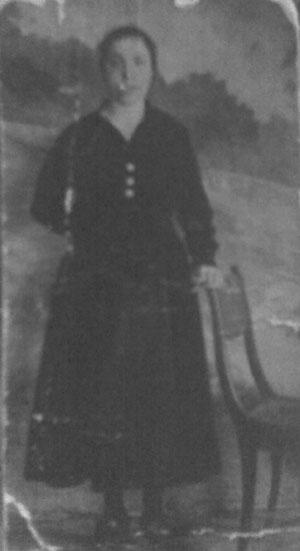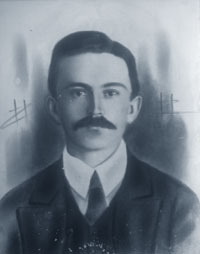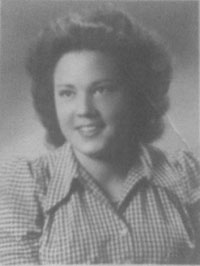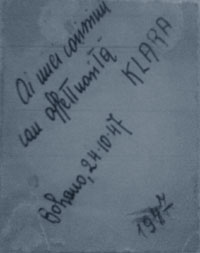









Elvira Antonovna Dudina, born in Yeniseysk in 1937. She was the 5th child within the family; graduated from School N° 1 in Yeniseysk in 1955 and then matriculated at the Institute of Pedagogics – faculty of physics and mathematics. In 1960 she completed her degree and was sent to the Makovsk District as a teacher for maths and physics.
 Parents:
Parents:
Mother – Olga Pavlovna Manylova (born in Yeniseysk in 1897), no school education,
she was sewing at home.
Father – Anton Franzevich Koch (born in the city of Linz, Austria, in 1888),
prisoner of war during World War I, deported to Yeniseysk in 1920 (this happened
to quite a lot of people, such as the Gagels, Konnichs). They got married in the
local Rozhdestvensk Church in 1920-21.
There were 5 children: 1921 – Liubov, 1924 – Elizabeth, 1927 – Viktor, 1934 – Albert.
In the „black“ year of 1937 there father was arrested pursuant to § 58 and kept in Yeniseysk prison until February1938; afterwards they said that he had been discharged. The very same day representatives of the NKVD came for him. Astonishingly, they acted with kindliness by waiting for a whole hour, until the children had returned home from school, thus giving everybody the possibility to say goodbye. After this incident all neighbours would look at them with distrust; they were of the opinion that he had been arrested for having committed some concrete crime and not just without any defined reason. Even little children started to calling them enemies of the people. They took parcels and bundles to prison, which they pushed through a special opening. Later they said that he was no longer there, but nobody knew, where they had taken him to. Only in 1953, when they started to rehabilitate the victims of Stalinist repressions, the learned that the pisoners had been guided to a place behind the barbed-wire fencing. They had to make a trench and line up right at its edge. They were all executed and buried on the spot. In 1953 the family received a document from Moscow saying that there father had been rehabilitated in lack of corpus delicti.
 Information from the Book of Memory:
KOCH, Anton Franzevich, born in Austria
in 1889. German, came from a farmer’s family, attended the German school for 5
years. Lived in Yeniseysk for some time. Vendor with „Krastorg“ (Krasnoyarsk
Trading Company; Translator’s note). Arrested on the 11.02.1938. Charged
pursuant to § 58-6 of the USSR Criminal Code. Sentenced by a commission made up
by NKVD representatives and the USSR Public Prosecutors to maximum penalty on
the 23.05.1938. Executed in Yeniseysk on the 06.09.1938. Rehabilitated by the
Military Collegium of the USSR Supreme Court on the 28.05.1957(P-7009).
Information from the Book of Memory:
KOCH, Anton Franzevich, born in Austria
in 1889. German, came from a farmer’s family, attended the German school for 5
years. Lived in Yeniseysk for some time. Vendor with „Krastorg“ (Krasnoyarsk
Trading Company; Translator’s note). Arrested on the 11.02.1938. Charged
pursuant to § 58-6 of the USSR Criminal Code. Sentenced by a commission made up
by NKVD representatives and the USSR Public Prosecutors to maximum penalty on
the 23.05.1938. Executed in Yeniseysk on the 06.09.1938. Rehabilitated by the
Military Collegium of the USSR Supreme Court on the 28.05.1957(P-7009).
All five children received their rehabilitation, as well. Her brother began to work in 1924, at the age of fourteen – downtown as a turner; he became a stakhanovite. Albert was drafted to the armee, however, they just took him up to Krasnoyarsk and then sent him back home without giving any reasons. While the children were at school they were not confronted with any restrictions at all. They became pioneers without any problems. Only the komsomol organization would not accept their membership irst attempt. At school they celebrated the beginning of the new year (ball, Christmas tree, „life“ music, costumes, masks, dansing under the accompanyment of a bayan, poems and songs), the 8th of March and the 7th of. November. Elvira Antonovna herself was very crazy about skating; in 1954 she even took part in some competitions. While she was studying at the institute she liked to play table tennis and volleyball. Several times they went to Krasnoyarsk to take part in competitions. Sister Liubov graduated from school and was then working in a kindergarten for the rest of her live – at first as a nursery-school teacher, later as a director. Elisabeth finished 9 classes at school, then trained as a bookkeeper and afterwards took up a job with the city council as a bookkeeper; later she worked as a bookkeeper for the professional school of pedagogics. Wages were paid punctually. Liubow, Elizabeth and Viktor were decorated with medals for having done a heroic job during the Great Patriotic War. After their father’s arrest, they did not have to go to any official authority to get registered and were allowed to move freely in any localities outside their settlement or village. The family felt inferior because of the status attributed to them by the local residents. They did not celebrate any special events, lived in narrow circumstances, and only much later, when life got slightly easier, they began to celebrate feasts marked red on the calendar, as well as birthdays. They did not keep their own little farm, did not own any livestock; they used to receive bread against food ration cards and shared it among the family members.
She recalls the names of the following exiles in Yeniseysk:
Interesting facts:
The mother’s sister, Klaudia Pavlovna Manylova, got married to an Italian called Minapace (second name); there was a daughter; later (in 1921) she left for Italy, when a general exchange of prisoners was on. Both sisters decided to travel abroad with their husbands, when this exchange of prisoners became possible, but then Olga Pavlovna changed her opinion and stayed at home. Her sister, however, left for Italy. They corresponded with eachother until 1947. The photo shows Olga Pavlovna’s Italian niece::


When they built the powerplant on the territory of the former prison, they
found the bones of a great number of unknown dead persons; they were taken to
the cemetary, buried in a mass grave – and later they even put up a memorial
stone in this place.
In Yeniseysk there were 13 churches, they were all destroyed and their bells
buried in the ground; just four of them still exist nowadays..
Interviewed by: Julia Kalenchuk, Darya Bondarenko, Aleksey Babiy
(AB – remarks given by Aleksey Babiy, Krasnoyarskr „Memorial“ Organization) – Eights expedition of history and human rights, Yeniseysk, Podtyosovo, 2011